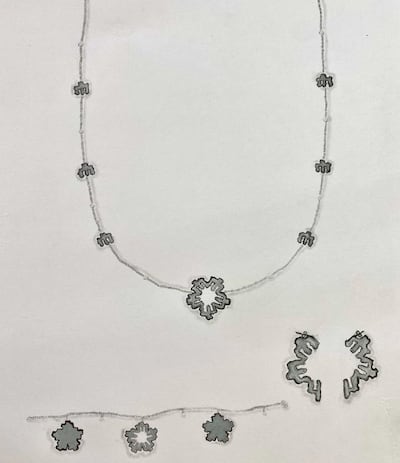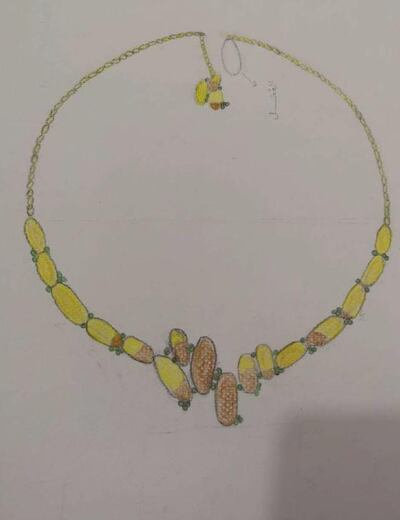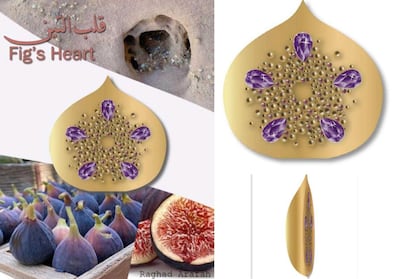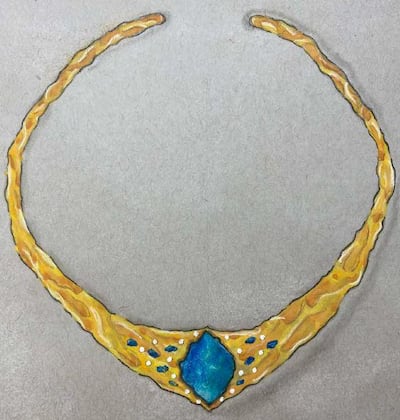The French jewellery housePiaget has announced the three winners of its Piaget Design Competition in Al Ula, in the Kingdom of Saudi Arabia
Launched in conjunction with the Royal Commission for Al Ula (RCU), to support artisan skills among the new generation, the project tasked 12 students from Madrasat Addeera with translating elements of the Unesco World Heritage site into high-end jewellery.
World famous for its dramatic landscapes and unique history, students were encouraged to interpret the beauty around them in a way that also included the codes of Piaget.

Now, the winners of the competion have been announced, with the top three slots going to women. Aysha Musa Al Shalali, 28, was awarded first place, for her design that incorporated the topographical lines of the site into a foulard necklace, bracelet and matching earrings. She also designed a torque necklace in gold that rippled like the surface of the dunes, and that was felt to offer a sense of storytelling.
Ashwaq Saud, meanwhile was awarded second place for her design that reimagined that Middle Eastern staple, the date, as large gold beads on a necklace. A second design by her also rethought the geometric al-qat patterning of the region into a charm necklace.
Raghad Ayman Arafah was named as third place, for her design of a brooch inspired by the fig, that gem stones with precious metals.

Piaget awarded the students with a ceremony at their school, with each winner applauded for her unique interpretation.
As the first such award run by Piaget in Saudi Arabia, the company aimed to bolster confidence and ignite a passion for jewellery within the students, to help ensure the success of artisanal skills in the kingdom. Piaget is as yet still undecided if the winning pieces will be made or not.
To assist the students in this competition – many of whom had never undertaken such design work before – Piaget called upon the Geneva University of Arts and Design (Head-Geneva), and Turquoise Mountain, founded by Prince Charles, to lend their considerable experience and guidance.
Head-Geneva began by pairing each student with one of its own students, while making its professors available for support and mentorship.
Realising hand skills rapidly die out if they are not profitable, Piaget has made a commitment to build a market for regional skills, and has run many similar competitions around the world to encourage would-be artisans to pursue careers using traditional, and often unique, skills and techniques.

In a statement, Caroline Welch-Ballentine, director of HR and sustainability at Piaget, explained that “since 1874, the Piaget family has always valued creativity as a bond between people, and supported its transmission across the generations.
"Piaget brand values are deeply rooted in corporate social responsibility, and we are proud to play our part in this transformation while also preserving the heritage and history that craftsmanship brings," she said.

Meanwhile, Nora A Aldabal, the arts and culture programming Director at RCU, explained that the competition aligned "perfectly with the Saudi Vision 2030 and RCU’s recently launched Journey Through Time masterplan.
"We intend to create a community of engaged, skilled, inspired locals who will be part of the authentic Al Ula story," she said, adding that the experience had been a "phenomenal opportunity for the local students to access the creative talent of a world-leading luxury jeweller”.
As part of the wider plan to redevelop the Al Ula region, the Madrasat Addeera school will be converted into a creative arts and culture hub, under the guidance of RCU. Tasked with overseeing the development of Al Ula, RCU was established in July 2017. It aims to balance growth in the area of natural and cultural significance, with responsible, sustainable and sensitive expansion.

